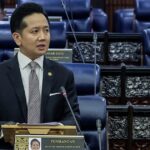Chee Hong Tat Defends Singapore’s GST Hike
Second Minister for Finance, Chee Hong Tat, recently spoke out in defense of Singapore’s decision to increase the Goods and Services Tax (GST) from 7% to 9%. He described the move as necessary to address the challenges posed by an ageing population and a volatile global economy. Chee Hong Tat emphasized that despite the nation experiencing higher-than-expected revenue, the GST hike was still crucial for Singapore’s future sustainability.
Rationale Behind the GST Hike
Chee Hong Tat highlighted the pressing need to cater to the increasing demands of an ageing society. With a growing elderly population, Singapore is faced with rising healthcare and social support costs. The GST increase is intended to secure the necessary funds to sustain these essential services and ensure the well-being of its citizens in the long term.
Moreover, the Minister pointed out the unpredictable nature of the global economic landscape. In the face of trade tensions, geopolitical uncertainties, and the ongoing COVID-19 pandemic, Singapore must bolster its financial resilience. The additional revenue generated from the GST hike will help the country navigate through economic challenges and maintain stability.
Addressing Concerns Over Strong Fiscal Surplus
Despite Singapore’s strong fiscal surplus, Chee Hong Tat defended the decision to raise the GST. He acknowledged the existence of a surplus but emphasized that it was crucial to look beyond the current financial status and consider the future sustainability of the nation. By proactively planning for the long term, Singapore aims to avoid potential fiscal strains in the future and ensure continued prosperity for its citizens.
Public Reaction and Criticism
The announcement of the GST hike has sparked mixed reactions among the public. While some citizens understand the necessity of the increase to support social welfare programs and economic stability, others have expressed concerns over the potential impact on their cost of living. Critics have argued that the burden of higher taxes may weigh heavily on lower-income households and exacerbate income inequality.
Government’s Assurance and Mitigation Measures
In response to public apprehensions, the government has reassured citizens that measures will be implemented to alleviate the impact of the GST hike on vulnerable groups. Various schemes, such as GST vouchers and subsidies, are expected to cushion the effects of the tax increase for lower-income individuals and families. The government is committed to ensuring that the GST hike is implemented in a fair and equitable manner.
Conclusion
Chee Hong Tat’s defense of Singapore’s GST hike underscores the government’s commitment to addressing the challenges posed by an ageing population and a turbulent global economy. While the decision has generated debates and concerns among the public, the government remains steadfast in its belief that the GST increase is a necessary step towards securing Singapore’s future sustainability. By balancing the needs of the present with the demands of the future, Singapore aims to navigate through uncertainties and safeguard the well-being of its citizens.
Source
This article is written in response to original article.








